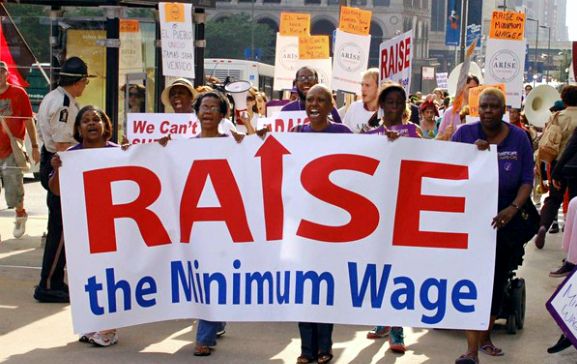Minimum wage divides experts
 Voters will likely decide on the November ballot whether or not to raise California’s minimum wage to $15 per hour, even though experts are still divided on the issue.
Voters will likely decide on the November ballot whether or not to raise California’s minimum wage to $15 per hour, even though experts are still divided on the issue.
There will be plenty of anecdotes in between now and November about the fruit picker or dish washer whose wages would rise 50 percent if the minimum wage were to jump from $10 to $15 per hour. But experts say that’s not the only factor to consider.
Experts agree that increased wages will increase prices, as employers are forced to compensate for increased labor costs. This means minimum-wage workers will lose some of their new-found earnings to inflation.
“Obviously, when minimum wage goes up, businesses try, if they can, to pass the extra costs to consumers,” said Dr. Esmael Adibi, director of the A. Gary Anderson Center for Economic Research at Chapman University. “So, a person who got a higher minimum wage will be paying higher for the products or services that they received, and as a result they may not be as well off.”
Some industries are more reliant than others on minimum-wage workers, so price increases won’t be universal, said Adibi, adding that not all of the increase will be passed on as higher costs, as businesses “cannot really proportionately pass all that cost onto consumers.”
Experts at the UC Berkeley Center for Labor Research and Education estimated in a 2015 study for the city of Los Angeles that increasing the minimum wage to $15 per hour incrementally over a five-year period would increase prices overall by less than 1 percent, and just under 8 percent in the restaurant industry, with the cost of the increased wages being absorbed through savings from lower turnover and increased productivity (better paid workers are happier workers).
“The increase in prices reduces overall demand for goods,” said Ken Jacobs, chair of the UC Berkeley Labor Center. “On the other side of the equation, workers have more money to spend, which increases the overall demand for goods. As a result, the net effect on economic activity is very small.”
What Does It Mean For Workers?
The UC Berkeley study on Los Angeles estimates that once all factors are considered, the average earnings for low-wage workers will increase 30 percent.
“That represents a very real economic gain for the workers,” said Jacobs.
UC Berkeley experts point to research highlighting how an increase in the minimum wage reduces dependency on public assistance programs, like food stamps, and how this, plus the increased minimum wage, would have a positive effect on poverty.
The Public Policy Institute of California reported in 2014 that 16.4 percent of Californians were living below the poverty line, which was at $24,000 per year for a family of four. That comes to $11.54 per hour for one income.
“Raising the minimum wage is not a cure-all, especially in the face of larger forces generating inequality that require national attention,” wrote the UC Berkeley experts. “Still, our assessment of the research evidence is that these policies have worked as intended in raising the incomes of low-wage workers and their families.”
But another study, by the Los Angeles County Economic Development Corporation, estimated that because of increased wages, employers may turn to automation, may reduce hours, may substitute the lowest-skilled workers with those who are more productive and may reduce thier share of the profits.
And as a result, prices will increase, employment for those at the bottom of the skills ladder will be diminished, employment growth will slow, and “there will be little impact, if any, on poverty in Los Angeles,” according to the LACEDC report.
What Does It Mean For Employers?
Many experts point to a ripple effect. As those at the bottom wage scale are paid more, workers slightly ahead of them — the shift supervisor, for example, who makes a few dollars more per hour than the minimum-wage workers — would have their status diminished as they’d be no longer making as much compared to those below them.
Even if the increased minimum wage bumps these workers up, employers may still have to give them another increase to compensate for their higher level of responsibility, tenure or skills.
Also, the minimum wage requirement for exempt employees (exempt from overtime) is based on the minimum wage. State law requires, in most instances, they be paid at least twice the minimum wage, so even employers with no minimum wage employees may see labor costs rise.
“That does affect everybody,” said Peter Tateishi, president and CEO of the Sacramento Metropolitan Chamber of Commerce.
And in some instances, the negative effects of an increased minimum wage are already being felt. An Oakland city councilman told the San Francisco Chronicle last month that when Walmart decided to close some local locations as part of nationwide downsizing, it was partially due to Oakland’s increased minimum wage.
The Chronicle also pointed out that a San Jose location — also subject to a higher minimum wage — would close as well, while two stores in San Leandro — where the minimum wage was no higher than the state’s — would remain open.
Income Inequality
Throughout the presidential debate, voters are reminded of the widening gap in income inequality. The rich are getting richer, the poor are getting poorer and the middle class is shrinking.
While proponents, like the experts at UC Berkeley, argue that increasing the minimum wage is worthwhile, detractors say that raising the minimum wage does nothing to increase upward mobility and fill in the gap.
According to Adibi, worker training, education and opportunity for advancement is the “fundamental issue,” so that the minimum wage is more “transitory.” According to Adibi, the increased minimum wage would certainly help, but isn’t going to make minimum-wage workers substantially more prosperous.
“The public policy should address the core policy here rather than put a band-aid on by increasing the minimum wage,” Adibi said.
Related Articles
NFL didn’t see Oakland bid to save Raiders as serious
As expected, NFL owners meeting at a Phoenix resort have given their blessing to Raiders owner Mark Davis’ plan to
ICE raids face CA resistance
Amid a fresh wave of immigration enforcement crackdowns, several powerful organizations in California have flexed their muscle to protect or benefit
AB32's echoes failed policy
JUNE 16, 2010 By JOHN SEILER Industrial policy is defined as government “policies that stimulate specific activities and promote structural




